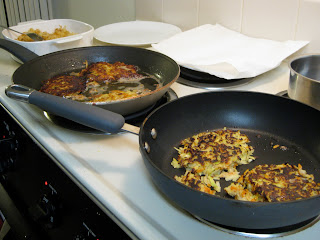Fatigue is a common symptom of Prednisone withdrawal, as is hair loss (Murphy et al 2009; Miozzari & Ambuhl 2004). So I guess I'll deal.
On the bright side, I saw a dietitian today. Unfortunately, dietitians/nutritionists within hospital systems tend to be... less knowledgeable than those of us who come in with specific questions might hope. I mentioned my concerns for balancing
1) soy products (as I don't eat dairy and need my fermented foods, but have been warned about over-consumption of soy and inflammation),
2) grains (high residue, high carb, my interest in leaning toward vegetables to substitute most grains/breads, etc.), and
3) sugars (even when I was diagnosed twelve years ago, one of the first things I was told was that I ate a lot of processed/complex sugars which probably exacerbated my gastrointestinal sensitivity among other things, and to stay away)Her response to my inquiry regarding all of these things was, "oh I wouldn't worry about that." I kid you not. I attempted to coax a more detailed explanation out of her, as I was eager for her opinion of what I had gleaned from my own research. Nada. She did not even allude to the Elimination, SC/Paleolithic, Mediterranean or any IBS-friendly diet. I'm so glad that by some glitch in the system there was no copay for this appointment. I understand that most nutritionists see patients who are new to approaching their medical care through a dietary component, and that many people just need to be told not to consume more than 200 daily grams of fat or drink more water or that they're allergic to some foods. It's not her fault she couldnt tell me exactly what I wanted to hear. It is her fault that she was totally unaware of how to answer any of the questions I asked -- I posed them to be specifically familiar to people in the nutrition profession (I have a friend who in nutrition whose first reaction to hearing the summary of the last four months was to ask if I had tried the Elimination diet and what it told me if anything). Clearly, if I want a more straight-forward conglomeration of all the research I've been doing, I need to see a naturopathic nutritionist, or someone straight out of college who still knows how important it is to understand how nutrition and disease interact.
On the actual bright side, I made apple/fennel/butternut squash soup with supper tonight. Pureed veggies are my saving grace. H.B. liked it! Yayer!




